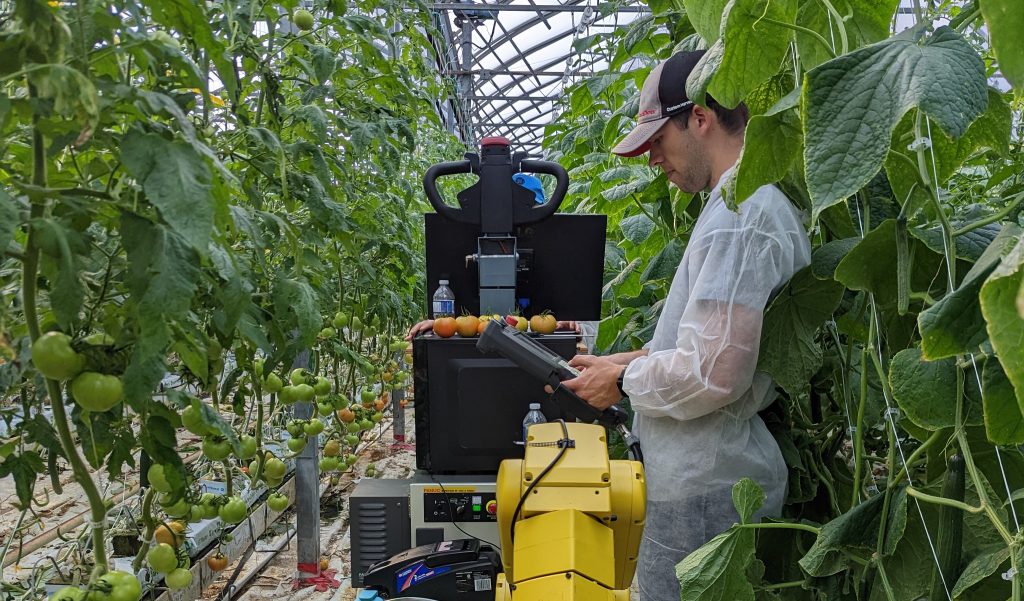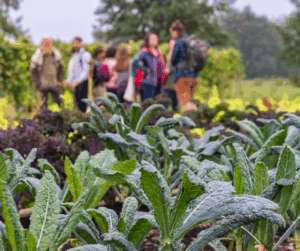Arrell Food Institute is excited to announce an investment of nearly $16.3M under the Lab to Market initiative to support Sustainable Food Systems for Canada (SF4C), a national innovation and entrepreneurship training platform designed to close Canada’s productivity gap and reduce greenhouse gas emissions.
The University of Guelph is the lead institution among a large network of national partners, including node leads and co-chairs from Canada’s leading agricultural institutions. Co-directed by Dr. Evan Fraser, director of the Arrell Food Institute and Dr. Lenore Newman, director of the Food and Agriculture Institute at the University of the Fraser Valley in B.C, the network will reduce barriers to technical learning and business growth across Canadian geographies.
“Current methods of food production are insufficient to meet increasing global demand and to mitigate the effects of climate change,” says Fraser. “Moreover, innovation is not a subset of the agricultural sector, it is a requirement for modern growers, producers, and processors. At the heart of SF4C is driven by a philosophy to nurture business-minded research and develop a Canadian base of educated innovators who will bring as many solutions as possible to the market.”

AFI Director, Evan Fraser alongside a group of students.
“As former president and member of the Deans Council of Agriculture, Food and Veterinary Medicine in Canada, a challenge has always been the ability to translate the wonderful and exciting innovations developed at our academic institutions into successful commercial products/technologies,” says Ricky Yada, dean of the Faculty of Agricultural, Life & Environmental Sciences at the University of Alberta. “Never has this challenge been more pressing as we face the most critical times in history resulting from the simultaneous manifestations of the pandemic, extreme weather events and geopolitical strife. SF4C will bring together the best minds/researchers to position Canada as a global leader in innovative solutions to address those challenges.”
Partners will contribute through programmatic nodes located across the country, with Guelph leading the Experiential node. The Innovation Node will be led by the University of Fraser Valley, an Indigenous Node is headed by the Territorial Agri-Food Association, and Universite Laval is leading a French Node. Co-chairing institutions include the University of Alberta, University of Manitoba, University of Saskatchewan, and Bridge to Land Water Sky. Other partners include national innovation focused organizations like the Ontario Genomics, Canadian Agri-Food Automation and Intelligence Network (CAAIN), the Canadian Food Innovation Network (CFIN), Bioenterprise Canada, and Zone Agtech.
“As we face a changing climate and challenging global political situations, it is more important than ever to grow our domestic food system,” says Co-Director Lenore Newman, of University of Fraser Valley. “SF4C is a national step forward in agricultural innovation, we are excited to extend expertise across the Canadian landscape.”

Dr. Lenore Newman speaking at the Arrell Food Summit.
This national network includes many of Canada’s top post-secondary institutions with expertise in the multi-disciplinary aspects of food and agriculture, as well as a network of funders, incubators and accelerators, and key private and not-for-profit organizations innovating and mobilizing knowledge in this space. More network details will be available as programming launches in early April. SF4C will leverage existing expertise, including AFI’s ongoing work in experiential education for innovators in agri-food, and is elevating new opportunities to understand needs and prepare a new generation of leaders.
“Feeding a growing global population while addressing the challenges of climate change demands a complete transformation of how we produce, process, and distribute food,” says Renée Michaud, Executive Director of INAF at Université Laval, alongside Sylvain Charlebois, Professor and Director of the Agri-Food Analytics Lab. “Innovation is no longer optional but essential across all stages of the agri-food value chain. The Eastern node, rooted in Quebec and Atlantic Canada, exemplifies the potential of regional collaboration to drive business-focused research and cultivate a new generation of leaders equipped to deliver practical, sustainable solutions for Canada and beyond. We are proud to contribute to the SF4C initiative, which embodies this philosophy and fosters a Canadian ecosystem of innovative, solution-oriented thinkers.”
“We need innovators to respond to transformations occurring in our Canadian agriculture and food sector. Innovation is a skill, and therefore it’s something we can teach and learn,” adds Amy Proulx, Professor and Academic Program Coordinator, Culinary Innovation and Food Technology at Niagara College, one of many partners contributing to the experiential education programming. “Microcredentials are a practical way to meet these learning needs, by making learning accessible through both formal education and non-traditional learning. Canada’s Colleges take a unique approach to learning, using Competency Based Education and Training practice, which makes learning methods practical and focused on immediate application for work and business development. We’re proud to share our experience in labour market needs assessment, skills forecasting, instructional design and microcredential development with the collaborative national network.”
This program is highlighting Canadian efforts to drive productivity in Agriculture. Food and agtech have been identified as key areas of opportunity not only for global sustainability, but for employment and technology to draw on Canada’s highly educated and qualified population. This is a time to celebrate what this can mean by extending all of our expertise across the country, especially to areas that have knowledge to share, but fewer supports and resources within their local ecosystems.

Evan Tollenar, Arrell Scholar Alumnus, using tomato picking robots. Read the full story here.
“Climate change is impacting Canada’s rural, remote and Indigenous communities at an alarming rate while they remain at the end of a very long supply chain. New ideas, new participants and new leaders in food production are needed,” offers Janet Dean, Executive Director of the Territorial Agrifood Association. “A national network like Sustainable Food Systems for Canada (SF4C) is vital to fostering the innovation necessary for food security and sovereignty for all Canadians as it empowers our communities to harness our local resources, enhance sustainable, traditional agricultural practices, and create resilient supply chains that honor cultural traditions while ensuring access to nutritious, locally-sourced food. The Rural, Remote and Indigenous Communities Node, rooted in the Northwest Territories, will help ensure the diversity of voices and practices needed to honour our food history and grow our food future inclusive of traditional knowledge holders and in alignment with Truth and Reconciliation calls to action.”
The Arrell Food Institute and the University of Guelph are proud to hold a key role in convening such a dynamic and dedicated group of leaders, in both our partner organizations and the individuals driving change throughout Canada. As programming begins later this year, we will share opportunities and information across our channels, newsletter and website. Follow us now to stay up to date, and to move forward together towards a more sustainable and resilient food system across Canada.
Read the University of Guelph’s full announcement here, outlining U of G’s role in this exciting new network.
About AFI
AFI seeks to improve global food systems by bringing together research, collaborative approaches and decision-makers across public and private sectors. We are focused on growing and supporting healthy resilient food systems that nourish communities and build economies. It is based at the University of Guelph in Ontario, Canada.
From developing an ag-tech innovation strategy, training the next generation of innovators to establishing a national school food program in Canada, AFI is creating new pathways toward more resilient food systems.
A resilient food system requires active participation from all members of the food system including but not limited to industry, producers, businesses, community groups and consumers.
Media Contact: Aaron Misener, Communications Manager at AFI | misenera@uoguelph.ca

Stay Connected to SF4C
Sign up for our mailing list for program updates and to get involved with SF4C!